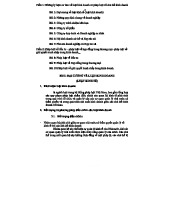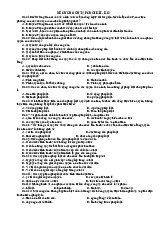












Preview text:
lOMoARcPSD| 38777299 lOMoARcPSD| 38777299 TABLE OF CONTENTS
I. Facts .............................................................................................................................. 1
II. Analysis ....................................................................................................................... 4
1. Related cases ............................................................................................................ 4
2. In the words of the court .......................................................................................... 5 3. Case’s
result:...........................................................................................................93. 1.
Doctors' reformation claims and Gateway's summary judgment motions .................. 9
3. 2. The court's reformation ruling ....................................................................... 10 4. Critical
thinking....................................................................................................114. 1.
Reformation ............................................................................................................... 11
4. 2. Different fact.................................................................................................11
5. Relating to vietnamese law...................................................................................12 I. FACTS -
In October 2012, Dr. John Holm and Dr. Lee Weiss filed a complaintagainst their
former employer, Gateway, an entity that coordinated anesthesiology services for
medical providers. Doctors both started working for Gateway in 2010 after each signed
a separate but identical two-year "non-member" employment agreement with
Gateway. In their complaint Doctors alleged that under the contracts, they agreed to
pay membership buy-in payments in anticipation of receiving offers of membership at
the end of the contract term. Additionally, they alleged that during contract
negotiations, Gateway's president told them they would become members ("partners")
in Gateway upon completion of the two-year contracts. The complaint also stated that
about three or four months prior to the end of their contracts, Gateway verbally
informed Doctors that it did not intend to make them partners, or renew their employment contracts. lOMoAR cPSD| 38777299 -
The complaint further stated that Weiss left prior to the end of thetwo-year
agreement, with Gateway's consent, and he had not been terminated within the
meaning of his employment agreement. The complaint also alleged Gateway later
released Holm from employment two weeks prior to the completion of the two-year
agreement, to avoid reimbursing him the buy-in payments. Doctors alleged, under
these circumstances, they were both entitled to reimbursement of their buy-in
payments, which Gateway denied. -
Prior to the jury trial, Doctors moved to reform each of theircontracts with
Gateway, asserting "the contracts as written did not clearly reflect the preexisting
agreements and mutual intent of the parties." They alleged that prior to signing the
contracts each doctor discussed their compensation with Dr. Jon Nottingham, then
president of Gateway, and, in Holm's case, also Dr. Brian Delisio, the subsequent
president. They claimed Nottingham explained to Doctors that Gateway utilized a three
pool-system of compensation for its physicians (the "eat what you kill pool," "the CRNA
pool," and the "first call or OB pool"). Further, Doctors alleged they were told they
would be paid equally "like partners" under the three-pool system with two exceptions:
a 10% founders' fee deducted from the CRNA pool; and buy-in payments equaling 20%
of their gross pay during their first year of employment, and 10% during their second
year of employment. Doctors argued the buy-in payments were for capital
contributions toward eventual partnership upon successful completion of two full years of employment at Gateway. -
Additionally, Doctors claimed the contracts as written wereambiguous because
they stated that Doctors would be paid based on "net collections" for their services,
and did not expressly define "net collections" as the three-pool system of
compensation described above. They alleged Gateway eventually "seized" upon the
ambiguous wording of their contracts to reduce their compensation and to deny them
the compensation agreed to above. Doctors asked the court to determine "that the
portion of the parties' contract relating to compensation be reformed in line with the
agreements made before they signed written agreements and that the compensation
portions of their contracts that referred to 'net collections' means payments as the
members of Gateway were paid, under the pool system." Gateway opposed the motion. lOMoAR cPSD| 38777299 -
Before the jury trial, and without considering Doctors' amendedcomplaint, the
court held a hearing and issued rulings on several motions for partial summary
judgment by Gateway. First, the court denied Gateway's partial summary judgment
motion regarding Doctors' breach of contract claims based on paragraph 7, the buy-in
provisions of the contracts. As discussed more below, the court found that "based on
the plain language" of paragraph 7 there was a genuine issue of material fact as to
whether Doctors were entitled to reimbursement of the buy-in payments. -
The court, however, granted Gateway's motion for partial summaryjudgment on
two issues, specifically finding the contract did not contain provisions entitling Doctors
to: 5.3% assessments and 12.8% assessments Gateway had taken out of the first call
pool and distributed to its partners, but not Doctors; or, a portion of revenues
generated by a non-partner physician hired after Doctors (the "Spangler revenues")
that Gateway had split among partners, but not Doctors. -
The court later heard oral arguments after Gateway and Doctorseach moved for
partial summary judgment on Doctors' reformation claims. Doctors again argued the
parties intended and agreed that they would be paid like partners, and thus, the
contract should be reformed to change the compensation portion of their separate
written contracts to reflect the intention of the parties. Doctors further identified
compensation they alleged that they ought to have received if they had been "paid like partners." -
The court granted summary judgment in favor of Doctors'reformation claims
and denied Gateway's summary judgment motions. The court found Doctors had
"proven by clear and convincing evidence that the parties had a meeting of the minds
and that the written contracts do not accurately reflect the agreement due to mutual
mistake" and thus "reformation was appropriate to ensure that the parties' agreement
is accurately reflected in the contract." -
Gateway moved for clarification of the ruling and the court issued aminute entry
stating "the court's ruling dealt with the issue that the written contract should mirror
the oral agreement, which it did not. The oral agreement was that the two individuals
were to be paid like partners." The court further directed that the parties "will need to lOMoARcPSD| 38777299
find a way to represent it to the jury so they can make a determination as to whether
they were paid like a partner." -
Based on the court's reformation ruling, instead of altering thecontract, the
parties entered into stipulations before the start of the jury trial. The parties first
stipulated to Doctors' damages, "amounts owed." This consisted of: (1) 5.3% and 12.8%
assessments from the first pool, (2) Spangler revenues, (3) Gateway's budget surplus,
(4) a stipend from Ironwood Hospital, (5) post-employment payments, (6) and the buy-
ins, should the jury find in favor of Doctors' breach of contract claims or their breach of
the implied contractual covenant of good faith and fair dealing claims. Second, the
parties also stipulated that after the jury trial, the court would later determine whether
any of the stipulated damages were subject to trebling. The court did not reform the
portion of their employment agreements dealing with the buy-ins because the pretrial
evidence supported the contention that the parties had not discussed reimbursement
of the buy-ins prior to signing the agreements -
Two of Doctors' claims were presented to the jury. First, Doctorsargued Gateway
breached paragraph 7 of their contracts, addressing the "Membership Buy-in"
payments. Specifically, Doctors asserted Gateway withheld excessive buy-in payments
and breached the agreements when it refused to reimburse Doctors all the buy-in
amounts at the end of their employment. Doctors also presented their respective
claims for breach of the covenant of good faith and fair dealing based on the
membership buy-in provision and Gateway's failure to tender return of their buy-in
payments upon separation. A jury later returned verdicts in favor of each of Doctors'
claims. Doctors' damages for both claims, decided by the jury, were reimbursement of their buy-in payments. II. ANALYSIS 1. Related cases
- De novo review: When a court hears a case “de novo,” it is deciding the issues without
reference to any legal conclusion or assumption made by the previous court to hear the
case. An appellate court hearing a case “de novo” may refer to the lower court’s record
to determine the facts, but will rule on the evidence and matters of law without lOMoARcPSD| 38777299
deferring to that court’s findings. A trial court may also hear a case “de novo” following
the appeal of an arbitration decision. 2. In the words of the court -
The court denied Doctors' motion because their complaint did notinclude
reformation in its prayer for relief. Doctors amended their complaint and included a
request for judgment against Gateway "for reformation of the written contracts
between Gateway and Doctors to reflect the actual agreements reached by the parties.” -
Before the jury trial, and without considering Doctors' amendedcomplaint, the
court held a hearing and issued rulings on several motions for partial summary
judgment by Gateway. First, the court denied Gateway's partial summary judgment
motion regarding Doctors' breach of contract claims based on paragraph 7, the buy-in
provisions of the contracts. As discussed more below, the court found that "based on
the plain language" of paragraph 7 there was a genuine issue of material fact as to
whether Doctors were entitled to reimbursement of the buy-in payments. -
The court, however, granted Gateway's motion for partial summaryjudgment on
two issues, specifically finding the contract did not contain provisions entitling Doctors
to: 5.3% assessments and 12.8% assessments Gateway had taken out of the first call
pool and distributed to its partners, but not Doctors; or, a portion of revenues
generated by a non-partner physician hired after Doctors (the "Spangler revenues")
that Gateway 5 had split among partners, but not Doctors. -
The court granted summary judgment in favor of Doctors'reformation claims
and denied Gateway's summary judgment motions. The court found Doctors had
"proven by clear and convincing evidence that the parties had a meeting of the minds
and that the written contracts do not accurately reflect the agreement due to mutual
mistake" and thus "reformation was appropriate to ensure that the parties' agreement
is accurately reflected in the contract." -
Gateway moved for clarification of the ruling and the court issued aminute entry
stating "the court's ruling dealt with the issue that the written contract should mirror lOMoAR cPSD| 38777299
the oral agreement, which it did not. The oral agreement was that the two individuals
were to be paid like partners." The court further directed that the parties "will need to
find a way to represent it to the jury so they can make a determination as to whether
they were paid like a partner." -
Gateway also appeals the denial of its separate summary judgmentmotions on
each of Doctors' reformation claims. This court does not generally review the denial of
a summary judgment motion unless it is on a point of law. Moreover, we do not address
the court's refusal to grant Gateway's summary judgment motions because we affirm
the court's grant of summary judgment in favor of Doctors. -
Gateway next argues there was no "intent" because "the partiesnever agreed
to, or even discussed, the specific amounts claimed by Doctors." Here, it is immaterial
whether the parties discussed the specific amounts, because the superior court
properly concluded that the agreement, understood by Doctors and Gateway, required
the Doctors to be "paid like partners" and thus was sufficiently specific. -
If we were to adopt Gateway's interpretation of reformation, after acourt found
by clear and convincing evidence that the proponent of reformation had met its
burden, the court would nonetheless enforce a contract as written. If this were the
case, there would be no need for reformation in any circumstance. Such a position is at
odds with the law of contracts. -
(Emphasis added.) Here, the superior court found that under thecontract's plain
language, the term "any" in the phrase "he shall not be responsible for paying any of
the buy-in Fee" was susceptible to more than one meaning. Specifically, the court found
that "any" could mean Doctors were not responsible for "all of the buy-in fees" paid,
meaning if Doctors were not made members they are not "responsible for having paid
that into the membership" or, alternatively, "any" could mean that if Doctors were not
made members they would not have to pay the fees moving forward. Thus, the court
concluded there was a genuine issue of material fact as to whether Doctors were
entitled to reimbursement under paragraph 7. -
Because we affirm the superior court's denial of Gateway'ssummary judgment
motion on Doctors' breach of contract claims, we need not and do not address lOMoAR cPSD| 38777299
Gateway's argument that the superior court erred in denying Gateway's motions for
judgment as a matter of law, raised at the close of the parties' cases, on Doctors' claims
for breach of the covenant of good faith and fair dealing. -
The parties' stipulated damages included the buy-ins, and damagesrelating to
not being paid like partners. The jury found that Gateway had breached paragraph 7 of
the employment agreements, and thus Doctors were entitled to reimbursement of
the buy-in payments. As such, the jury's verdicts that Gateway had breached the
covenant of good faith and fair dealing did not result in an award of any additional
damages; the damages sought under the breach of contracts claims and breach of the
covenant of good faith and fair dealing claims were for reimbursement of the buy-in payments.
Moreover, the court later denied Doctors' request for treble damages regarding the
buy-ins. Thus, the superior court's denial of Gateway's Rule 50 motion has no impact
on the resolution of this appeal, and we decline to address this issue. -
The court properly instructed the jury that its previous rulings hadno bearing on
what the jury must decide in the case. Thus, the court did not err in declining the
instruction. (it is an error to instruct a jury on issues or theories not supported by
evidence "because it invites the jury to speculate as to possible non-existent
circumstances") (citation omitted). Lastly, Gateway requested the court add the
following paragraph to the standard instruction on 19 good faith and fair dealing under
RAJI 16: *19 [A] cts that comply with the terms of the contract cannot, without more,
be equated with bad faith. The duty of good faith and fair dealing must relate to existing
contract terms, and does not impose additional obligations upon a party that are outside of the contract.
Again, the requested instruction would have misled and confused the jury about what,
under Arizona law, constitutes a breach of the duty of good faith and fair dealing.13 As
such, there was no obligation on the court to grant Gateway's request and the
instruction the court did provide adequately instructed the jury on that issue. This court
has previously stated, "a party can breach the implied covenant of good faith and fair
dealing both by exercising express discretion in a way inconsistent with a party's
reasonable expectations and by acting in ways not expressly excluded by the contract's lOMoAR cPSD| 38777299
terms but which nevertheless bear adversely on the party's reasonably expected benefits of the bargain." -
Gateway contends the assessments and the Spangler revenueswere not
"wages," but rather "partnership profits." The court, however, did not abuse its
discretion in determining that they were "wages." Gateway agreed to pay Doctors like
partners except for the founders' fee and the buy- in payments, and thus, the
assessments and Spangler revenues were compensation Doctors reasonably expected
in return for their services as all members enjoyed this increase in earnings. -
The court also did not err in concluding Gateway lacked areasonable good faith
basis to withhold these wages. Gateway first attempts to frame its failure to pay
Doctors the return of the additional wages as a "mistake" made in "hindsight."
Gateway's position ignores the consequences of Doctors' successful claim for
reformation, which, as discussed, under Arizona law requires "a definite intention on
which the minds of the parties had met preexisted the written instrument and that the
mistake occurred in its execution." Thus, Gateway's attempt to reframe its failure to
pay Doctors as partners—which would include the assessments and Spangler
revenues—as a "mistake" in which it "turned out to be wrong" is precisely what the
Court determined; they withheld wages without good cause. Had Gateway been
diligent in correcting the "mistake" this issue would not be the subject of litigation -
The court denied Gateway's motion for partial summary judgmenton Doctors'
unjust enrichment claims, and specifically cited the assessments and the Spangler
revenues as justification for the denial. Accordingly, there is no basis for Gateway's
position that the court's rulings demonstrated that Gateway had a "reasonable" good
faith reason for withholding these amounts -
Accordingly, the superior court did not abuse its discretion in findingthe
assessments, Spangler revenues, budget surplus, and Ironwood stipend were treble
damages. Because we affirm the rulings of the superior court, Gateway's appeal of the
superior court's pre-trial ruling rejecting Gateway's motion for partial summary
judgment on Doctors' unjust enrichment claims, which did not go to the jury, is moot and we do not address it. lOMoARcPSD| 38777299 3. Case’s result:
3. 1. Doctors' reformation claims and Gateway's summary judgment motions -
First, the court denied Gateway's partial summary judgment motionregarding
Doctors' breach of contract claims based on paragraph 7, the buy-in provisions of the
contracts. As discussed more below, the court found that "based on the plain language"
of paragraph 7 there was a genuine issue of material fact as to whether Doctors were
entitled to reimbursement of the buy-in payments. -
The court, however, granted Gateway's motion for partial summaryjudgment on
two issues, specifically finding the contract did not contain provisions entitling Doctors
to: 5.3% assessments and 12.8% assessments Gateway had taken out of the first call
pool and distributed to its partners, but not Doctors; or, a portion of revenues
generated by a non-partner physician hired after Doctors (the "Spangler revenues")
that Gateway had split among partners, but not Doctors. -
The court later heard oral arguments after Gateway and Doctorseach moved for
partial summary judgment on Doctors' reformation claims. Doctors again argued the
parties intended and agreed that they would be paid like partners, and thus, the
contract should be reformed to change the compensation portion of their separate
written contracts to reflect the intention of the parties. Doctors further identified
compensation they alleged that they ought to have received if they had been "paid like partners." -
The court granted summary judgment in favor of Doctors'reformation claims
and denied Gateway's summary judgment motions. The court found Doctors had
"proven by clear and convincing evidence that the parties had a meeting of the minds
and that the written contracts do not accurately reflect the agreement due to mutual
mistake" and thus "reformation was appropriate to ensure that the parties' agreement
is accurately reflected in the contract." -
Gateway moved for clarification of the ruling and the court issued aminute entry
stating "the court's ruling dealt with the issue that the written contract should mirror
the oral agreement, which it did not. The oral agreement was that the two individuals
were to be paid like partners." The court further directed that the parties "will need to lOMoARcPSD| 38777299
find a way to represent it to the jury so they can make a determination as to whether
they were paid like a partner."
3. 2. The court's reformation ruling -
Based on the court's reformation ruling, instead of altering thecontract, the
parties entered into stipulations before the start of the jury trial. The parties first
stipulated to Doctors' damages, "amounts owed." This consisted of: (1) 5.3% and 12.8%
assessments from the first pool, (2) Spangler revenues, (3) Gateway's budget surplus,
(4) a stipend from Ironwood Hospital, (5) post-employment payments, (6) and the buy-
ins, should the jury find in favor of Doctors' breach of contract claims or their breach of
the implied contractual covenant of good faith and fair dealing claims. Second, the
parties also stipulated that after the jury trial, the court would later determine whether
any of the stipulated damages were subject to trebling. The court did not reform the
portion of their employment agreements dealing with the buy-ins because the pretrial
evidence supported the contention that the parties had not discussed reimbursement
of the buy-ins prior to signing the agreements. -
Two of Doctors' claims were presented to the jury. First, Doctorsargued Gateway
breached paragraph 7 of their contracts, addressing the "Membership Buy-in"
payments. Specifically, Doctors asserted Gateway withheld excessive buy-in payments
and breached the agreements when it refused to reimburse Doctors all the buy-in
amounts at the end of their employment. Doctors also presented their respective
claims for breach of the covenant of good faith and fair dealing based on the
membership buy-in provision and Gateway's failure to tender return of their buy-in
payments upon separation. A jury later returned verdicts in favor of each of Doctors'
claims. Doctors' damages for both claims, decided by the jury, were reimbursement of their buy-in payments. -
The court later found that the stipulated damages, except for thebuy-ins and the
post-employment payments, were treble damages. It awarded Weiss damages in the
amount of $442,182.12, attorney fees in the amount of $142,981.35, and costs in the
amount of $11,571.83. It also awarded Holm damages in the amount of $439,123.80,
attorney fees in the amount of $142,981.35, and costs in the amount of $11,571.83. lOMoARcPSD| 38777299 -
Because we affirm the rulings of the superior court, Gateway'sappeal of the
superior court's pre-trial ruling rejecting Gateway's motion for partial summary
judgment on Doctors' unjust enrichment claims, which did not go to the jury, is moot and we do not address it -
For the foregoing reasons, we affirm the rulings of the superiorcourt. As the
prevailing parties, we also award Doctors their costs, and attorney fees on appeal,
contingent upon their compliance with ARCAP 21. 4. Critical thinking 4. 1. Reformation
- Reformation is a court’s equitable power to modify a contract to reflect the parties’
true intent where some error has been committed. Courts require plaintiffs seeking to
reform a contract to prove certain elements, however. The Oregon Supreme Court in
Jensen v. Miller summarizes the common law requirements for showing reformation,
stating that parties seeking reformation must show: “that there was an antecedent
agreement to which the contract can be reformed; that there was a mutual mistake or
a unilateral mistake on the part of the party seeking reformation and inequitable
conduct on the part of the other party; and that the party seeking reformation was not
guilty of gross negligence.” Reformation is used only when the court has clear,
convincing evidence of intent on behalf of both parties. This strategy may only clarify,
not change, the terms of the contract. If changes are made, each party must initial the
revision. A rider can be created to correct the mistake or an entirely new version of the
contract can be drafted. Courts often encourage parties to agree on reformation and
will enforce the new contract if another dispute arises. 4. 2. Different fact
- If we were to adopt Gateway's interpretation of reformation, after a court found by
clear and convincing evidence that the proponent of reformation had met its burden,
the court would nonetheless enforce a contract as written. If this were the case, there
would be no need for reformation in any circumstance. Such a position is at odds with
the law of contracts. See Taylor v. State Farm Mut. Auto. Ins. Co., 175 Ariz. 148, 152 lOMoAR cPSD| 38777299
(1993) ("Generally, and in Arizona, a court will attempt to enforce a contract according to the parties' intent.") 5. Relating to vietnamese law
- Điều 420 BLSD năm 2015 quy định trong trường hợp hoàn cảnh thay đổi cơ bản, bên
có lợi ích bị ảnh hưởng có quyền yêu cầu bên kia đàm phán lại hợp đồng trong một thời
hạn hợp lý. Trường hợp các bên không thể thỏa thuận được về việc sửa đổi hợp đồng
trong một thời hạn hợp lý, mọt trong các bên có thể yêu cầu Tòa án sửa đổi hoặc chấm
dứt hợp đồng. Như vậy, tòa án có thể can thiệp vào nội dung hợp đồng khi đáp ứng đủ 3 điều kiện sau:
+ Khi hoàn cảnh thay đổi cơ bản;
+ Bên có lợi ích bị ảnh hưởng đã yêu cầu bên kìa đàm phán lại hợp đồng trong một thời gian hợp lí;
+ Các bên không thể thỏa thuận được về việc sửa đổi hợp đồng trong một thời hạn hợp lí.




